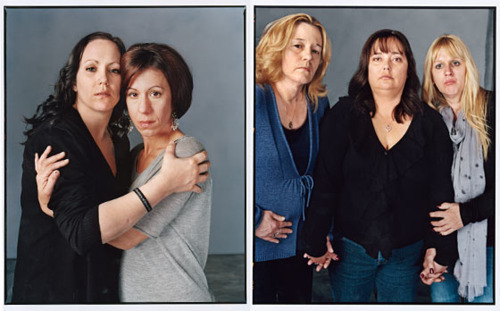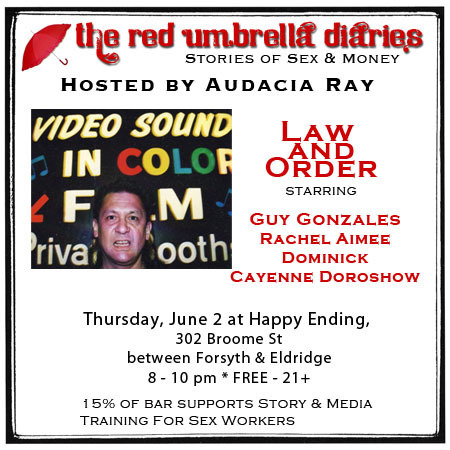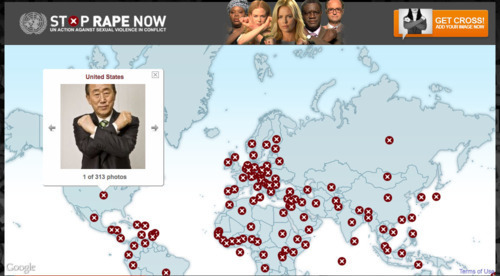Audacia Ray's Blog, page 53
June 1, 2011
The Bond Between the Mothers and Sisters of the Long Island...

A must read article about the mothers and sisters of the Long Island serial killer's victims, and the bond that has grown between them since December.


"Even if people believe you, you are tested beyond what any crime victim should have to endure. While..."
-
Woman in Rape Case Says Verdict Left Her 'Devastated' - NYTimes.com
This, coupled with some pieces I've been reading today about the ongoing Long Island serial killer(s) case(s), has me pretty bummed about the so-called justice system.
But still, I believe its worth fighting and is so necessary, even in the face of all this.


May 31, 2011
Sex work, whether legal or illegal, has a long history of brush...

Sex work, whether legal or illegal, has a long history of brush ups (or flat out collisions) with law enforcement, and on June 2 the Red Umbrella Diaries focuses on the stories of the crossing between sex workers, cops, and the judicial system. Come join us on Thursday, June 2nd from 8 to 10 pm at Happy Ending in New York's Lower East side (302 Broome Street between Eldridge and Forsyth). Our fabulous performers include Guy Gonzales, outlaw writer and denizen of the peep shows & massage parlors of Times Square's heyday; and Rachel Aimee, a founding editor of $pread Magazine and former stripper. They're joined by Dominick, a retired sex worker & writer, and Cayenne Doroshow, former social worker and avid cook.
Free, and 15% of the bar supports media training workshops for sex workers.
Bios and photos of the performers are here.


Stripper Army #1 The Legal Edition
I am reading and enjoying the stripperarmy zine. Nothing like righteous sex worker anger to keep me going.


May 26, 2011
""It's especially bad when it happens in progressive media, which makes an effort—or at least pays..."
"It's especially bad when it happens in progressive media, which makes an effort—or at least pays lip service—to promote the idea that media diversity isn't just an optional thing but a necessity."
Asked what he thinks about a white-dude panel boycott, Ackerman said it makes sense. "It's within our power and it's up to us to say, 'Why don't you include my colleague who works on something similar, who has possibly more to say because they're not listened to as frequently,'" he says. "And if we don't do it, there's no incentive for people organizing these things to think more critically about why it is they're not including these diverse voices."
"-
Why White Men Should Refuse to Be on Panels of All White Men - Media - GOOD - StumbleUpon
Definitely a better/more thoughtful way to use privilege. But also rough because the white cis dudes remain the gate keepers.
Getting people to move over and give up privileges is a fucking uphill battle if there ever was one.


(Review) The Convert: A Tale of Exile and Extremism
 The Convert: A Tale of Exile and Extremism by Deborah Baker
The Convert: A Tale of Exile and Extremism by Deborah Baker
My rating: 2 of 5 stars
Ultimately, The Convert was unsatisfying to me because it seemed like the big reveal was "Maryam/Margaret/Peggy is crazy*." Maryam Jameelah (born Margaret Marcus, Peggy to her family) is an American Jewish woman raised on Long Island who converted to Islam and moved to Pakistan in the early 1960s, when she was in her late 20s. The book is structured around Maryam's conversion, her struggles with fitting in (or not) in both Long Island and Pakistan and the possibility of her mental illness. Told through reconstructions/edits of Maryam's letters (edited by the author) and the author's investigative journalism, the book reveals after we read through a bunch of very articulate letters from Maryam that Maryam has spent time in a mental institution, in both New York and Pakistan. Surprise! People with mental illnesses can be good writers with logical trains of thought!
In both of the cultural contexts Maryam lived in, she was an outcast - in the U.S. she was seen as freakishly modest and sexually frigid (a la her Freudian psychoanalysts), in Pakistan she was too bold and outspoken. In both places, her quite-to-anger temper was a defining feature of her interactions with other people. I would have liked to read more about sexism in both of these contexts and how the mental institution solution was not necessarily about Maryam herself.
Throughout the book, the author alternates between using the names Maryam, Margaret, and Peggy, as if to underscore her crazy. I mean, really, what kind of woman uses three names? Only a crazy one!
There are lots of interesting things about this book, but I think the author could've gone deeper in interrogating the ways in which mental illness has been used against Maryam throughout her life.
*I use the word "crazy" throughout this review to capture the dismissive way in which mental illness is treated in our culture. It's not a word I condone the use of, because it frequently is used to delegitimize a person's experiences and ideas about the world.
View all my Goodreads reviews


May 25, 2011
Ah — the gulf between rhetoric and actual impact.
This is...

Ah — the gulf between rhetoric and actual impact.
This is a screen grab of the UN's Stop Rape Now campaign against sexual violence in conflict zones. And that would be the UN's Secretary General, Ban Ki Moon, making a gesture that says, "rape isn't cool!" The site encourages users to add their very own pics of themselves making this gesture.
So, I'm a communications professional - and I know that building awareness of issues, especially hard to stomach ones, is both important and challenging to do. More people should know about the fucked up things going on in our world, even if it makes them feel small and helpless.
But, person sitting comfortably in front of your computer in the global north… your tweets and uploaded pics aren't actually making sure that fewer people in the Congo get raped.
Good intentions aren't enough, and this campaign exists more for its online audience (affluent people in the global north) than it does for the 1,100 people being raped in the DRC every day.


"But perhaps, we have come to a point in feminist movement-building where we need to acknowledge that..."
…
What becomes an issue is those white women and liberal feminist women of color who argue that "slut" is a universal category of female experience, irrespective of race. I recognize that there are many women of color who are participating in the SW movement, and I support those sisters who do, particularly women who are doing it in solidarity and coalition. But rather than forcing white women to get on the diversity train with regard to the inclusivity of SlutWalk, perhaps we need to redirect our racial vigilance. By that I mean, I'd prefer that white women acknowledge that they are in fact organizing around a problematic use of terminology endemic to white communities and cultures."
-
SlutWalks v. Ho Strolls « The Crunk Feminist Collective
Important to read the whole thing, but here are two really important takeaways from this piece about SlutWalk.


May 22, 2011
Primary school teacher who led double life as kinky sex dominatrix free to continue working with children | Mail Online
(via Tits and Sass)
A primary school teacher in the UK is allowed to keep her job after parents discovered she was also a dominatrix — unlike Melissa Petro, who was fired from her job after she wrote about being a prostitute years after she left the profession.
However, certain forms of prostitution is legal in the UK, while prostitution in the US is not legal. If prostitution was legal in the US, the situation with Melissa Petro may have turned out differently.
Thoughts?
This may seem overly nuanced, but Melissa was careful with her words and wrote that she provided sexual services, and didn't explicitly say that she worked illegally as a prostitute. There are of course a range of sexual services that aren't prostitution, but of course there are very few people who will make that distinction. That said, I think her situation would be the same if she had just stuck to writing about her work as a stripper - there are frequently cases in the U.S. where women are fired from teaching jobs after being discovered as having done various legal forms of sex work, like stripping or porn.


May 20, 2011
"Choice, not coercion
Yet thinking about becoming a sex worker and actually becoming one are..."
Choice, not coercion
Yet thinking about becoming a sex worker and actually becoming one are different things, admits Felix Betzler. He says, though, he was still surprised at some of the study's results.
"One of our key findings is that one out of 27 students who replied to our survey have had experience in sex work or are still engaged in it. In this group of sex workers there are as many men as there are women, which came as a surprise to us, too. We had assumed that there would be more women," he says.
The authors of the study say their findings show that the majority of students engage in sex work because they see it as the best way to earn good money quickly. Some make up to 3,000 euros ($4,300) per month, and most need the money because they're heavily in debt.
"-
Red lights aflame as European students opt for sex work | Europe | Deutsche Welle | 20.05.2011
More on the shocking! revelation that students (this is a study of students in Western Europe) are engaging in sex work and sometimes preferring to other work.
However, the dichotomy between choice and coercion is drawn yet again. All choices, especially ones about earning money, are constrained by something. To continue drawing a wide divide between choice and coercion without talking about the circumstances under which people do sex work is highly problematic.





